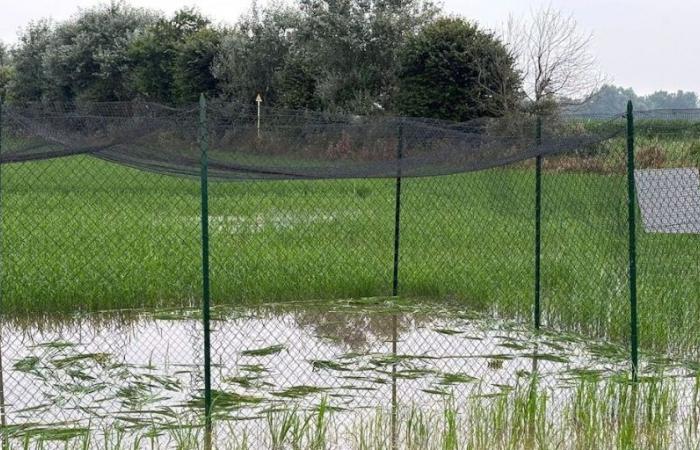On the night between 20 and 21 June in Mezzana Bigli, in the province of Pavia, a small experimental rice cultivation managed by a research group from the State University of Milan was destroyed. Last May 13th the field was sown with a variety of rice developed by researchers with “assisted evolution techniques in agriculture” (TEA), methods for modifying the DNA of plant organisms different from those used for so-called “genetically modified organisms”. modified” (GMO). This variety, called RIS8imo, has been designed to be more resistant to brusone (Pyricularia oryzae), a fungus that is very harmful to rice crops.
On Friday morning the small rice field was found mowed, that is, with the rice plants uprooted. So far, no messages claiming responsibility have been received by the research group, which however suspects that the cultivation was destroyed by a “group of eco-terrorists”, who tampered with the surveillance camera and removed the metal protection net around the field.
In Italy, the cultivation of GMOs is prohibited, while for less than a year it has been possible to request field testing of plants developed with TEA thanks to one of the rules contained in law 68 of 13 June 2023, mainly dedicated to contrast measures to drought. The law provides for the possibility of sowing plant varieties produced «with genomic editing techniques through site-directed mutagenesis or cisgenesis for experimental and scientific purposes», only within authorized experimental sites and for scientific research purposes, and more precisely for obtain more productive plants that are resistant to bacteria, fungi and difficult environmental conditions, such as drought.
– Listen It takes a science: Big news from a small grain of rice
RIS8imo was developed with these techniques starting from a risotto rice, Telemaco, which is similar to Arborio. Studies on the variety began in 2017 and until this year had only been conducted in the laboratory. It was designed by the research group led by Vittoria Brambilla and Fabio Fornara, professors of Botany at the University of Milan (as well as wife and husband), with the idea of allowing cultivations less dependent on the use of fungicides.
In more detail, to produce the RIS8imo, Brambilla and Fornara’s research group used the CRISPR/Cas9 technique – the one for which Emmanuelle Charpentier and Jennifer A. Doudna won the Nobel Prize for Chemistry in 2020 – to “silence” the expression of three genes that influence the susceptibility of rice to brusone. It is a process that can potentially occur spontaneously even in nature and which, however, researchers have intentionally reproduced in the laboratory.
A rice plant torn from the ground (Vittoria Brambilla/Milan State University)
The sowing of RIS8imo in an open field had been authorized by the Ministry of the Environment and Energy Security at the beginning of the year and had the aim of verifying whether in a field the modified variety was really more resistant to brusone than the normal Telemaco rice.
The experimental rice field is 28 square meters large, therefore it has a limited surface area, and is hosted by a local agricultural company. It was entirely fenced and covered with a net, so that birds and rodents could not enter and therefore potentially take the RIS8imo plants elsewhere.
Again to avoid the spread of the plants outside the fenced area, and in particular in the rice fields for food production, the land closest to the experimental field had been left uncultivated, as required by the authorization rules. The portion of agricultural land used to “isolate” the experimental field is 400 square meters, four times larger than that theoretically necessary to avoid cross-pollination with wild or weedy plants, according to scientists’ assessments.
“As public scientists we express shock and sadness at having suffered unjustified violence, the result of obscurantism and anti-scientific impulses,” Brambilla and Fornara wrote in the statement on the destruction of the cultivation.






